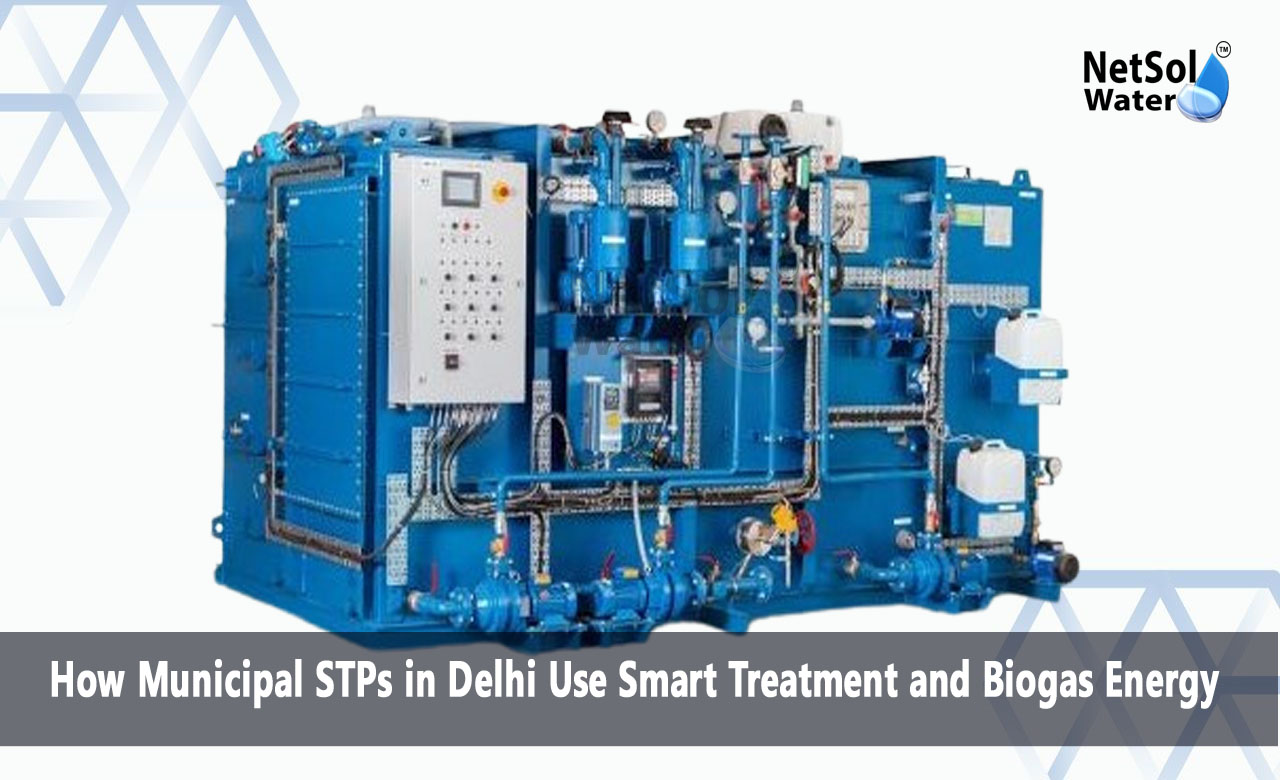How Municipal STPs in Delhi Use Smart Treatment and Biogas Energy?
Delhi, with its increasing population and increasing urbanization, is facing very serious wastewater management issues. Delhi generates humungous quantities of sewage everyday. Municipal governments have established large numbers of sewage treatment plants (STPs) within the National Capital Region to address this. Sewage treatment alone is no longer adequate — energy-efficient and sustainable practices are the rule of the day.
This is why municipal STPs in Delhi use smart treatment and biogas energy recovery methods to not only clean wastewater but also generate renewable energy and reduce operating costs. These advanced technologies help Delhi treat more sewage, reduce pollution in the Yamuna River, and create energy from waste.
Smart Treatment in Delhi’s STPs
Smart treatment is the use of automation, sensors, remote monitoring, and data-driven decision-making in the sewage treatment process. This is the way Delhi municipal STPs implement smart treatment:
Automation and IoT Integration
Recent Delhi STPs employ control systems using automation. The systems monitor and regulate various processes such as aeration, sludge withdrawal, and addition of chemicals. Flow rate, pH, turbidity, and dissolved oxygen are sensed in real time by sensors. The data is collected and monitored for the purposes of optimization of the operation.
Remote Monitoring
STPs in Delhi are now being operated from central control rooms. Real-time feedback regarding plant performance, energy usage, and water quality is fed to the operators. At the occurrence of a fault, alarms are generated instantly, reducing downtime and maximizing efficiency.
Membrane and Advanced Treatment
Some of the recent STPs include more advanced membrane filtration like MBR (Membrane Bio-Reactor) or tertiary treatment for high-grade output water. This allows the reused water to be utilized for non-potable purposes like gardening, cooling, or even industrial purposes.
SCADA Systems
The Supervisory Control and Data Acquisition (SCADA) system is widely used in Delhi’s bigger STPs. SCADA helps in tracking plant performance and quickly adjusting to changes in influent flow or pollutant load.
By using such smart technologies, municipal STPs in Delhi use smart treatment and biogas energy recovery strategies to not only manage sewage effectively but also run their plants with precision.
Biogas Energy Recovery
Biogas recovery of energy is yet another important facility of Delhi's modern STPs. This is how it works, and why it matters:
Anaerobic Sludge Digesters
Sludge that is generated during sewage treatment is pumped into huge digesters where microorganisms break down the organic material in anaerobic conditions. It yields biogas — a mixture of methane and carbon dioxide.
Biogas Collection and Storage
The generated biogas is captured and stored in the gas holders. It is employed as a clean fuel to operate generators or boilers in the STP, reducing the dependence on grid electricity.
Power Generation
Some STPs in Delhi have set up biogas-based power generation plants. The electricity generated is used for operating the plant itself. This renders the plant energy-independent and reduces operational costs.
Thermal Use
Apart from electricity, biogas is also being used to produce heat for sludge drying and other thermal applications.
Thus, Delhi municipal STPs utilize smart treatment and biogas energy recovery to create a closed-loop process where waste is treated and converted into a valuable resource.
Environmental and Economic Advantages
Using smart systems and energy recovery has many advantages:
· Reduces Pollution: Treated sewage is less harmful to the Yamuna River and the surrounding environment.
· Energy Conservation: Biogas produced on site saves electricity by a substantial amount.
· Carbon Savings: Biogas replaces fossil fuels and lessens carbon footprint.
· Operational Efficiency: Smart technologies reduce errors, maintenance costs, and manpower.
Government Initiatives
Delhi Jal Board (DJB) has been leading the development of existing STPs with upgrades and new ones with in-built smart and energy recovery systems. These upgrades are in alignment with national initiatives like:
· Namami Gange Mission
· Swachh Bharat Abhiyan
· National Bio-Energy Mission
With such schemes, STPs in Delhi municipalities adopt intelligent treatment and biogas energy recovery not just as a technical upgrade, but as a part of a grand national mission for sustainable urban development.
Conclusion
Delhi’s experience shows how combining smart technologies with biogas recovery can transform wastewater treatment into a sustainable, cost-effective, and eco-friendly process. Municipal STPs in Delhi use smart treatment and biogas energy recovery not only to clean water but also to generate clean energy — setting an example for other cities in India and around the world.
Investment in such systems is protecting our environment, promoting public health, and preparing our cities for water-limited future while being cost-effective and efficient.
Do you need an advice or assistance on selecting the best water and waste water treatment unit? We have solutions for all your problems!
Let us know your problem, our experts will make sure that it goes away.
For an assistance or related query,
Call on +91-9650608473 Or write us at enquiry@netsolwater.com



